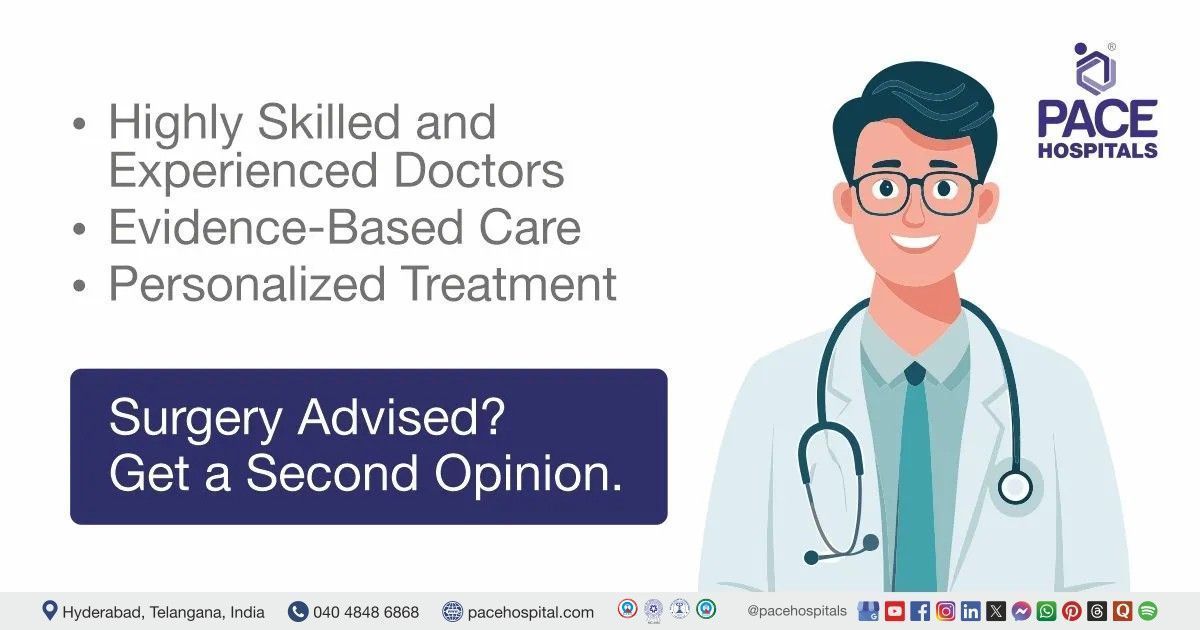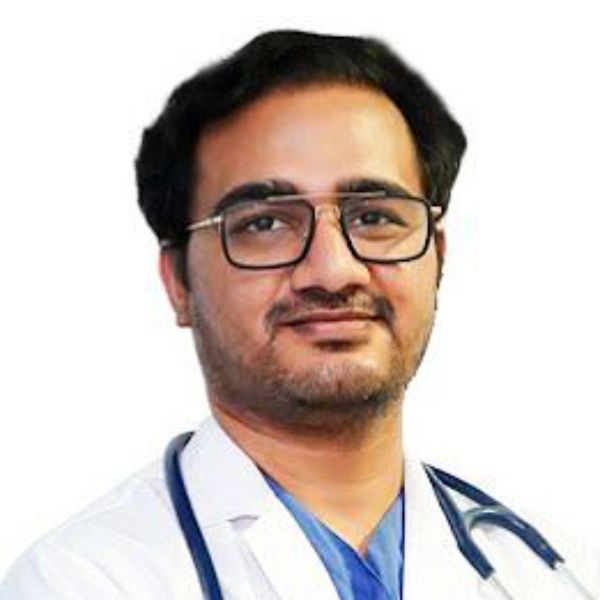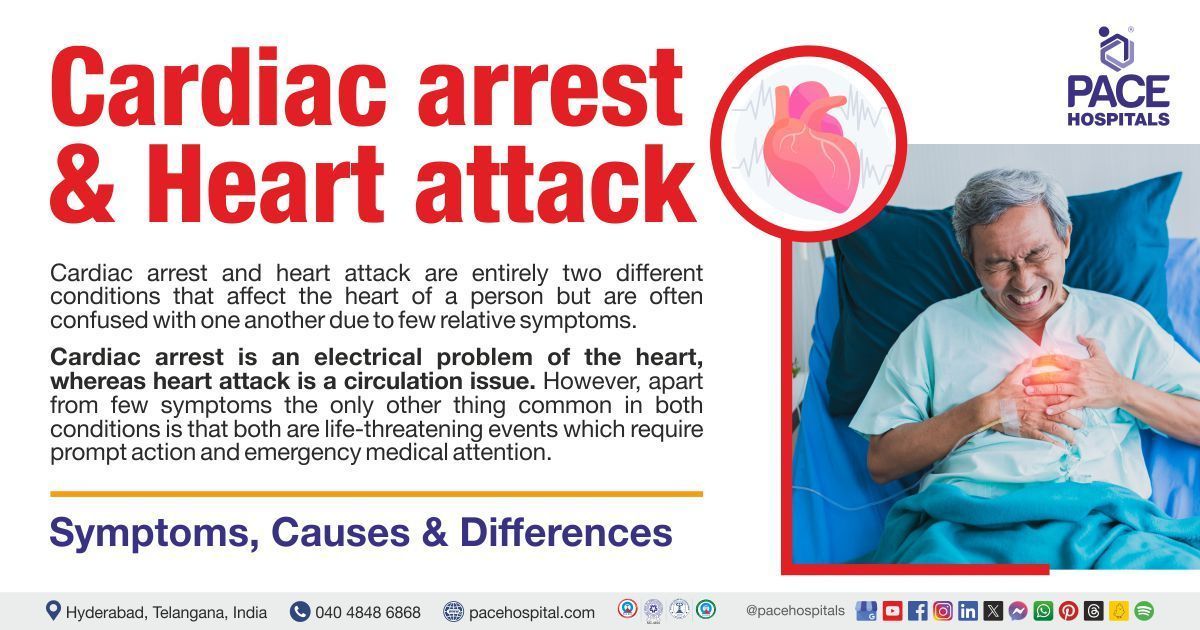Best Heart Attack Doctor in Hyderabad for Advanced Cardiac Care
PACE Hospitals
✅ Recommended by 9,452 Happy Patients. Get hassle-free appointments with Heart Attack Specialists.
Dr. Seshi Janjirala
MBBS, MD (General Medicine) & DM (Cardiology)
Experience : 14+ years
Consultant Interventional Cardiologist, Specialist in Endovascular Procedures
Specialist
Dr. Seshi Vardhan Janjirala is recognized for his advanced procedural skills and specialized interventions in cardiology.
- Rotablation (certified, Mount Sinai, USA)
- TAVI operator (certified, University Medical Centre, Astana)
- Advanced endovascular procedures:
- Penumbra and Angiojet techniques for DVT management
- Placement of IVC filters and stents (peripheral ¢tral arterial/venous)
- Pacemaker Implantation:
- Single & double chamber devices
- ICDs (Implantable Cardioverter Defibrillators)
- CRT-D systems
- Non-surgical closure techniques:
- Atrial septal defects (ASD)
- Ventricular septal defects (VSD)
- Patent ductus arteriosus (PDA) closures
Expertise
With extensive experience in cardiovascular care, Dr. Seshi Vardhan Janjirala expertly diagnoses and treats a wide range of heart and blood vessel conditions.
- Heart failure
- Arrhythmias
- Coronary artery disease
- Septal defects (ventricular/atrial)
- Coarctation of the aorta
- Myocarditis
- Pulmonary atresia
- Tricuspid atresia
- Myocardial infarction
- Atherosclerosis
- Uncontrolled hypertension
- Valvular heart disease
- Cardiogenic shock
- Peripheral artery disease
- Acute coronary syndrome
- Truncus arteriosus
- Emergency care (Heart Attack, Chest pain)
- Recurrent symptomatic ventricular tachycardia
- Complete Heart Block
- Sudden cardiac arrest
Consultation Details
Languages Spoken: English, Hindi
Timing: Mon to Sat – 10 AM to 6 PM
Location: PACE Hospitals, HITEC City
Consult a Top Heart Attack Specialists in Hyderabad for Emergency Heart Attack Care
PACE Hospitals is recognised for having some of the Top Heart Attack Specialists in Hyderabad, India. Our cardiology team offers advanced care for patients dealing with chest pain, artery blockages, and sudden cardiac emergencies. With years of expertise, we focus on timely intervention and personalised advanced heart attack treatment that supports safe recovery and lowers the chances of future complications.
Accurate diagnosis plays a vital role in cardiac care. At PACE Hospitals, our experienced cardiologist/heart attack doctor utilizes modern diagnostic tests, including ECG, echocardiography, cardiac enzyme analysis, and coronary angiography, to identify heart conditions at the earliest stage. These evaluations guide treatment plans that are safe, effective, and tailored to each patient.
We provide a complete spectrum of services ranging from medications and clot-dissolving therapies to angioplasty, stent placement, and bypass procedures. In complex cases, our renowned heart attack surgeons perform advanced coronary bypass surgeries with precision, ensuring patients receive the highest level of surgical care when required.
Known for clinical excellence, PACE Hospitals is a preferred choice for patients seeking the Best Heart Attack Doctor in Hyderabad, India. Alongside emergency care, our dedicated doctors for heart attack offer comprehensive long-term follow-up, preventive care, and personalized lifestyle guidance. With 24/7 emergency response, advanced facilities, and a patient-first approach, we remain committed to protecting and improving heart health at every stage.
Frequently Asked Questions (FAQs) on Heart Attack
What are the symptoms of a heart attack?
Common symptoms include chest pain or pressure, which may move to the arms, neck, jaw, or back. Some people feel short of breath, sweaty, dizzy, or very tired. Nausea or a feeling of indigestion can also happen. Symptoms may develop suddenly or gradually and may range from mild to severe. Any unusual or persistent chest discomfort should be treated as an emergency and reviewed by an experienced cardiologist/heart attack specialist.
How many heart attacks can a person survive?
The number of heart attacks a person can survive depends on how severe each one is, how quickly treatment is given, and the person’s overall health. Some people recover from more than one heart attack if damage to the heart is limited and proper care is received. However, each heart attack increases the risk of serious complications. It is important to follow medical advice and take steps to prevent future heart attacks under the care of the best heart attack doctor.
What is the difference between a heart attack and cardiac arrest?
A heart attack happens when blood flow to part of the heart is blocked, damaging the heart muscle. The heart usually keeps beating during a heart attack. Cardiac arrest, however, occurs when the heart suddenly stops beating altogether, and blood flow to the body stops. Cardiac arrest is more dangerous and requires immediate CPR and medical care. A heart attack can sometimes lead to cardiac arrest if not treated quickly. Advice from the best heart attack specialist at PACE Hospitals in Hyderabad, India is recommended.
What causes heart attacks in young people?
Heart attacks in young people are less common but can happen. Causes include genetic conditions that affect cholesterol or heart structure, drug use (such as cocaine), and lifestyle factors like smoking or obesity. Sometimes, inflammation of the arteries or rare blood vessel problems are involved. Even though young people are generally at lower risk, unhealthy habits and certain inherited conditions can increase the chance of a heart attack at a young age. For such cases, the best doctor for heart attack should be consulted.
How to treat a heart attack?
Heart attacks are considered medical emergencies. Doctors give medicines to dissolve or prevent clots and reduce heart damage. Many patients have a procedure called angioplasty, where doctors open the blocked artery using a small balloon and place a stent to keep it open. Oxygen, pain relief, and medicines to improve blood flow are given too. After the emergency, long-term treatment includes medicines, lifestyle changes, and regular check-ups with a heart specialist. This care is often managed by the best doctor for heart attack treatment in Hyderabad at PACE Hospitals.
Which specialist treats heart attack patients?
Heart attack patients are mainly cared for by cardiologists, doctors who specialize in heart problems. In emergencies, interventional cardiologists may perform procedures to open blocked arteries without surgery. Cardiac surgeons are involved if an operation, like bypass surgery, is needed. After a heart attack, cardiac rehabilitation specialists help patients recover and make lifestyle changes to protect heart health in the future. In such cases, a heart attack surgeon may also play a vital role alongside cardiologists.
What is a heart attack?
A
heart attack, also known as a myocardial infarction (MI), happens when the blood supply to a part of the heart muscle is interrupted, commonly by a blood clot. This blockage stops oxygen from reaching the heart muscle, which can cause damage or death of the tissue. A heart attack is a medical emergency that can be fatal if not addressed promptly. The primary cause is the accumulation of fatty deposits, known as plaque, in the arteries that carry blood to the heart. Consult the
best doctor for heart attack in Hyderabad, India for timely care.
How to prevent a heart attack?
Heart attacks can often be prevented by maintaining the health of the heart and blood vessels. Eating a balanced diet lower in fat and salt, staying physically active, not smoking, and maintaining a healthy weight are important steps. Regular check-ups to control blood pressure, cholesterol, and blood sugar also reduce risk. Managing stress and avoiding excessive alcohol can help too. Healthy habits keep arteries clear and the heart strong. Regular monitoring with the
best doctor for heart attack treatment in Hyderabad, India can also lower risks.
Does high blood pressure cause a heart attack?
High blood pressure, also called
hypertension, increases the risk of a heart attack. Over time, high blood pressure damages the arteries, making them more likely to develop fatty deposits that can block blood flow. This damage makes it easier for clots to form and cause a heart attack. Managing blood pressure in a healthy range is important for protecting the heart and lowering the risk of heart attacks. Early consultation with a
best heart attack specialist doctor is often advised.
How to detect a heart attack?
Doctors use several methods to find out if someone is having a heart attack. An electrocardiogram (ECG) checks the heart’s electrical activity for signs of damage.
Blood tests can show if the heart muscle has been hurt by looking for special proteins released during a heart attack. Other tests, like heart scans or angiography, may also be used to see blockages and assess damage. Symptoms and tests together help doctors make the diagnosis, usually confirmed by a
heart attack treatment doctor/Cardiologist.
Can anxiety cause a heart attack?
Anxiety is not a direct cause of heart attacks, but frequent or severe anxiety may increase the risk over time. Anxiety can raise blood pressure and heart rate, which puts stress on the heart. People with ongoing anxiety may also develop unhealthy habits like smoking or poor eating, which increase risk. However, a sudden anxiety or panic attack can feel similar to a heart attack, so it is important to seek medical help if unsure. In such cases, a
cardiologist/heart attack specialist doctor can help with proper evaluation.
Can an ECG detect a heart attack?
Yes, an electrocardiogram (ECG) measures the heart’s electrical activity and helps detect a heart attack by showing characteristic changes such as ST elevation or other irregularities. It is often one of the first tests done in suspected heart attacks to confirm diagnosis and guide treatment. But some heart attacks may require additional tests, such as blood markers, for full confirmation. This is best interpreted by a
heart attack treatment doctor.
What troponin level indicates a heart attack?
Troponin is a protein secreted into the blood when the heart muscle is damaged. Even a small increase above the normal level can mean there is injury to the heart. A level higher than about 0.04 ng/mL (for troponin I) is often considered abnormal and may suggest a heart attack, but the exact number can vary by laboratory. Doctors look at the troponin level together with symptoms, ECG results, and repeat tests to confirm if it is a heart attack. These results are usually reviewed by a
good heart attack doctor.
Is a heart attack genetic?
Heart attack risk can partly run in families. People with close relatives who had heart disease or a heart attack at a young age have a higher chance of developing one themselves. This is because genes can influence cholesterol levels, blood pressure, and how arteries behave. However, genetics usually combine with lifestyle factors such as diet, exercise, smoking, and conditions like high blood pressure or cholesterol. A family history increases risk, but healthy habits still make a big difference. People with such risks should consult the
best heart attack specialist in Hyderabad, India.
What is a silent heart attack, and the 4 silent signs?
A silent heart attack happens when the heart muscle is damaged due to blocked blood flow, but produces no classic symptoms, like chest pain. Many people do not realize they have had one until diagnosed later through tests like an EKG or heart imaging. Silent heart attacks can cause the same heart damage as typical heart attacks and increase the risk of future cardiac events.
Four common silent signs of a heart attack include:
- Unusual tiredness or weakness.
- Shortness of breath.
- Mild pain or discomfort in the chest, back, or arms.
- Discomfort in the neck, jaw, or back.
These signs are often mistaken for less serious problems, which can delay proper care. For proper evaluation, consult a
top heart attack specialist in Hyderabad, India.
Can gas cause a heart attack?
Gas in the digestive system does not directly cause a heart attack. However, symptoms of severe gas or indigestion can sometimes be mistaken for heart attack symptoms, such as chest discomfort or pressure. It's important to remember that while gas is usually harmless, any new or worsening chest pain, especially when it is accompanied by other symptoms such as shortness of breath or arm pain, needs to be inspected by a doctor immediately to rule out a heart attack. Patients often seek help from the
good doctor for heart attack treatment in such cases.
What to do when someone gets a heart attack?
When someone has signs of a heart attack, call emergency services immediately. Help them sit down and stay calm. If they are conscious and if advised by a medical professional, help them take a tablet recommended to reduce clotting, as long as they are not allergic. Loosen tight clothing and keep them warm. If they stop breathing or lose consciousness, start chest compressions and continue until medical help arrives. Quick action can save their life and reduce damage to the heart. Emergency support is provided by a
trusted heart attack specialist.
Which is worse, a heart attack or a stroke?
Both heart attacks and strokes are serious emergencies, but they affect different organs. A heart attack damages the heart, while a stroke damages the brain. The outcome depends on how severe it is and how quickly treatment is given.
Strokes often cause lasting disability, like paralysis or speech problems, while heart attacks can lead to heart failure or death. Both require immediate medical care, usually managed by a
heart attack treatment doctor.
Can an antiplatelet medication prevent a heart attack?
Yes, antiplatelet medications can help prevent a heart attack in certain people. These medicines stop blood platelets from sticking together and forming clots that can block heart arteries. They are often recommended for people who have already had a heart attack, stroke, or are at high risk of heart disease. However, they are not suitable for everyone because they can increase the risk of bleeding. A doctor needs to decide if they are appropriate. Advice is often given by an
experienced heart attack doctor.
How long can a heart attack last?
A heart attack’s active symptoms typically last from a few minutes up to several hours. Some people may experience symptoms slowly worsening over hours or even a few days before a full attack occurs. Without treatment, symptoms can persist longer, increasing heart damage and risk of death. Prompt medical care is critical because longer symptom duration without treatment worsens outcomes. These emergencies are best managed by the
best heart attack specialist at PACE Hospitals in Hyderabad, India.
How many beats per minute is a heart attack?
There is no specific heart rate that defines a heart attack. During a heart attack, the heart rate can be normal, fast, or slow, depending on the area affected and the severity. Some people develop dangerous rhythms, like very fast (tachycardia) or very slow (bradycardia). What matters most are the symptoms and medical tests, not just the number of beats per minute. Such conditions should be checked by a
heart attack specialist doctor.
Does cholesterol cause heart attacks?
Yes, high levels of certain types of cholesterol, particularly LDL ("bad") cholesterol, significantly contribute to heart attacks. Excess cholesterol can accumulate in the artery walls over time, resulting in fatty deposits known as plaque. This plaque narrows the arteries, making it harder for blood to flow. If it ruptures, it can trigger a clot that blocks blood flow to the heart. This can result in a heart attack. Patients with high cholesterol often consult top heart attack specialists in Hyderabad, India.
Is an inferior myocardial infarction a heart attack?
Yes, an inferior myocardial infarction is a type of heart attack. It refers to damage to the lower portion of the heart muscle, which usually occurs due to a blockage in a coronary artery supplying that region. "Myocardial infarction" is the medical term used for a heart attack, describing heart muscle injury due to inadequate blood flow. So, an inferior myocardial infarction is simply a heart attack affecting the lower part of the heart.
Can sinus tachycardia cause a heart attack?
Sinus tachycardia is a faster-than-normal heartbeat that starts from the heart’s natural pacemaker. It is usually a response to stress, fever, exercise, or anxiety, and in healthy people, it is not dangerous. However, if the fast rate happens because of an underlying heart problem, it could strain the heart. On its own, sinus tachycardia does not directly cause a heart attack but may worsen symptoms if heart disease is already present. These cases should be evaluated by the experienced heart attack specialist.
What our patients have to say
Related Articles
Why choose PACE Hospitals?
- A Multi-Super Speciality Hospital.
- NABH, NABL, NBE & NABH - Nursing Excellence accreditation.
- State-of-the-art Liver and Kidney transplant centre.
- Empanelled with all TPAs for smooth cashless benefits.
- Centralized HIMS (Hospital Information System).
- Computerized health records available via website.
- Minimum waiting time for Inpatient and Outpatient.
- Round-the-clock guidance from highly qualified super specialist doctors, surgeons and physicians.
- Standardization of ethical medical care.
- 24X7 Outpatient & Inpatient Pharmacy Services.
- State-of-the-art operation theaters.
- Intensive Care Units (Surgical and Medical) with ISO-9001 accreditation.
Share on
Request an appointment
Fill in the appointment form or call us instantly to book a confirmed appointment with our super specialist at 04048486868
Appointment request - health articles
Recent Articles














